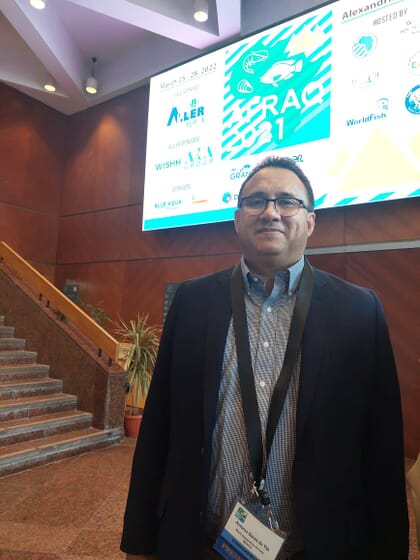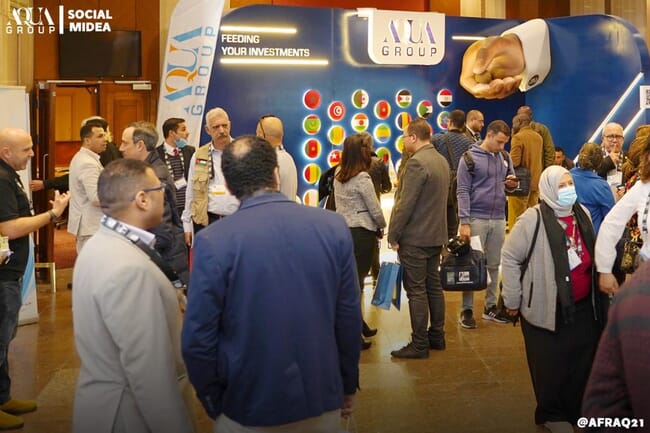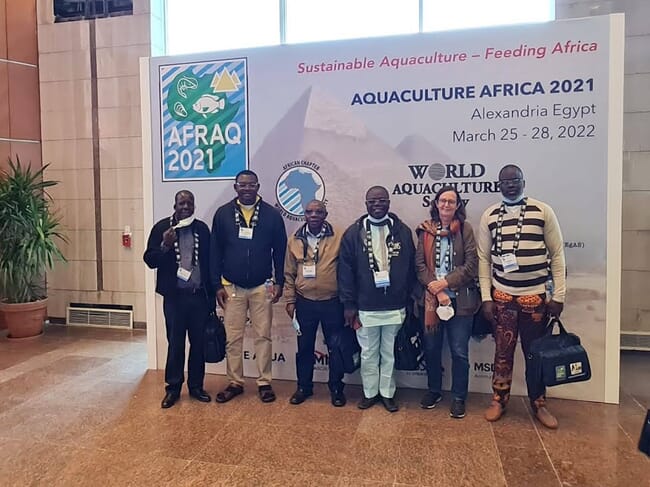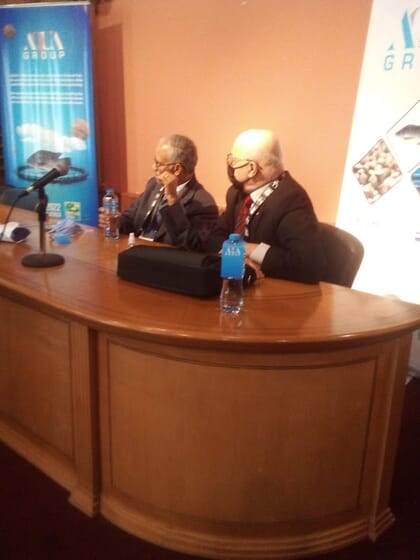
For the first-time visitor coming from 27°C degrees in Accra Ghana, the 10°C welcome offered by the historic city of Alexandria was very unfriendly. But all that faded away as I entered Bibliothek Alexandria for the beginning of AFRAQ 2021, the twice postponed conference and exhibition hosted by the World Aquaculture Society and other partners, which eventually took place from 25 to 28 March.
This was an event that was well attended by many of the pre-eminent players in African aquaculture, and saw a good amount of business being done. Exhibitors and delegates were almost unanimous that the event’s impact on African aquaculture will be significant.
President of the World Aquaculture Society (WAS) Antonio Garza de Yta was a very satisfied man on the final day.
“174 participants from 74 countries. That’s definitely something to be happy about. And when you look at the people who came, and the interactions, I would say that a lot of business has been done,” he reflected.
Dr Lanre Badmus, director of the West African section of WAS, said, “we could not ask for a better event. Exhibitors have come in from all over Africa, Europe, including Russia, and both North and South America. And participation in the sessions was very good, which is not surprising considering the quality of speakers. But I am particularly gladdened that AFRAQ offered the opportunity for a good number of people in African aquaculture to meet and interact, face to face. For some two years we were unable to meet due to Covid. We were able to keep in touch by the frequent webinars we organised. They were very useful, and we will be working closely together from now on.”
For many of the delegates and exhibitors, AFRAQ 2021 gave a strong indication of the potential for substantial aquaculture business between African countries. Some African enterprises are already making significant inroads in their sub-regions.

Ghana’s SkyFox, for example, was getting firmly rooted in Burkina Faso, Sierra Leone and Guinea, until Covid-19 intervened. But the company has since started ramping up operations, with plans for an outpost in Nigeria this year.
Another Ghanaian company, Flosell, is in partnership with local companies in Zambia and Rwanda, and CEO Evans Danso said he was confident that “we will become a major player in that region very soon”.
Meanwhile Novatek Zambia’s Robert Kanyembo said he had recently been busy in advisory roles in Angola, Malawi and Rwanda. He believes that, “through cooperation with regional partners aquaculture can advance substantially in the next few years”.

Another indication of the potential for growth in Africa’s aquaculture can be seen in the spread of international feed companies. At the Aller Aqua stand at the expo, Lasisi Nurudeen, the feed company’s country manager for Nigeria said that “our company is operating with a deep understanding of the African market and its requirements. Presently we account for a decent portion of the market, but we will increase our market share when our factory is completed”.
Dutch poultry and fish feed manufacturer, Koudijs, has been busy in Africa recently, taking up significant market share in Ghana, and with an Ethiopian plant now operational.
Wassim Nassar, regional manager for The Aqua Group – a feed producer based in Egypt – said, “in East Africa we are based in Uganda, but we are supplying customers in Kenya and beyond. We are on the ground in Southern Africa. And we are making good progress in Ghana, The Ivory Coast and Burkina Faso. We are planning on building a West African plant soon, but for now we are trying to ensure that farmers get access to good quality feed. We will also get involved in the provision of high quality technical management of farms. The African market is fast expanding, and we want to facilitate that expansion.”
There are also indications that African aquaculture can diversify into marine production, and delegates expressed interest in learning from the experience of some Tanzanian farmers who are currently producing tilapia in several stages – starting with fingerlings in brackish waters close to the sea, and ending in cages in the sea. Consultations were started which should soon result in sharing of experiences and personnel.

Dr Alexander Kefi, director of fisheries in the Zambian Ministry of Fisheries and Livestock, said “we came here expecting to meet and interact with people who can help as advance aquaculture in Zambia, and we have not been disappointed. Aquaculture is a major economic and development issue, and our government is paying a lot of attention to it. Our private sector is doing well, and government wishes to bring in partners to encourage increased output”.
Participants at AFRAQ were spoiled by the quality of the presentations at the well attended lectures. These included Diseases caused by incorrect nutrition by Prof Abdel-Fattah Mohammed El Sayed and Biosecurity in fish management by Prof Mohammed Marzouk. The joint presentations led by Karen Veverica reflected the projects sponsored by the World Initiative for Soy in Human Health, which is developing technical skills among personnel in quite a number of countries. In the last few years, fish farm personnel from Ghana, Burkina Faso, Tanzania, Senegal, Nigeria and Benin have been sponsored to take part in international training programmes which are expected to impact significantly on the quality of fish farms.




